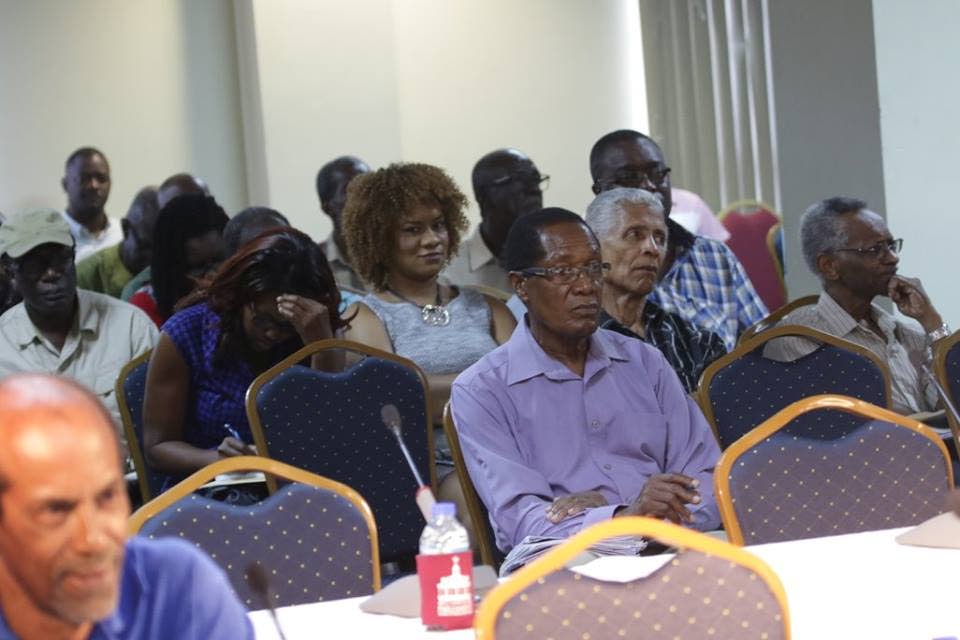Tobagonians must have a common position

By Kinnesha George-Harry
The Tobago Self-Government Bill, as presented in Parliament, does not allow for inclusive governance nor does it define Tobago to enable equality of status, and so fails in its bid to deliver self-determination to the island.
So argued Economist Dr Vanus James at last Sunday’s first public hearing on the Constitution (Amendment) (Tobago Self-Government) Bill 2018, held by the Joint Select Committee at the Victor E Bruce Financial Complex in Scarborough.
“This matter is so important that we’ve got to get it right. We’ve got to get something that all sides in the Parliament can support, both the Opposition and the Government and I want to agree with your early comments… that a major part of our objective here is to upgrade our democracy and there are critical parts in that direction that we don’t have at all, not mentioned in the bill,” James told the committee,” James said.
He noted that Trinidad and Tobago has signed on to the sustainable developmental goals (of the United Nations) and that a big part of that was inclusive governance.
“There is no effort in this bill to deal with that issue and after you take our history, long history from slavery to now into account, one of the major objectives of anybody framing a constitution, to say nothing of an amendment, on behalf of the people of Tobago, … should care a lot about mechanisms to allow the public to be properly integrated into the process of governing beyond the elections,” he said.
James also said in 2016, he had the opportunity to read Bill A and Bill B (developed out of consultations in Tobago by the Forum of Political Parties), contending that the bill which was said to have been presented to Parliament, fails to address the critical issue of defining Tobago and Trinidad.
“Bill A and Bill B, they both included the definitions of Tobago and Trinidad and that is a glaring omission in this bill. If the goal is equality of status, we are going to need that definition.
“… the Tobago Legislature as defined in the bill should have a say in many elements including foreign affairs and the Government of Trinidad and Tobago… the Government of Trinidad will have a say in those areas and Tobago will not under these provisions, that will not work in the end,” he pointed out.
James said the bill as presented, notwithstanding its intent, does not succeed in delivering self determination to Tobago.
“There are two senses in which we need to consider that. One is political and a crucial one is the economic self-determination, mechanisms to promote the achievement of economic self-determination rather than the growing dependence that we see exhibited in the data. We need some reworking, and it also doesn’t succeed in upgrading our democracy beyond what we now have in the current THA Act, some reworking is also needed in that regard,” he advised.
In terms of reworking the bill, James referred to a position he said he heard articulated previously by current Chief Secretary Kelvin Charles - that a common position should be formulated by Tobagonians.
“Tobagonians should formulate a common position and submit that common position to you as a committee.
That common position has not yet been articulated and this bill does not represent it. So, I want to agree with the Chief Secretary on that and in that context, commit to working with and supporting and articulating elements of that common position that you can receive as a committee to do your work,” he said.
In response, Chairman of the committee, Camille Robinson-Regis said no changes were made to the bill but admitted that the definition of Tobago was removed:
“…we made no changes to the bill, we did remove the definition of Tobago, based on advice from the Ministry of Foreign Affairs in terms of International Law, so we did have to remove the definition of Tobago,” Robinson-Regis said.
Committee member, Clarence Rambharat, in his comments, said that given the nature of the society, searching for a common good was idealistic.
“Dr James, you know I respect your views and I came here expecting to hear you. I am not surprised that we have been asked to search Tobago for another common position. My question is how much time would be spent searching for a common position.
“The reality is once you have competing political parties and once you have people of different interests, you would not have common views, that is just the nature of our society so the search for common views is not something that we should be looking for.
What we should be searching for and the objective of consultation is to get views and opinions and ultimately, we may agree on some and we may disagree on some, but we would understand what everybody is thinking,” he said.


Comments
"Tobagonians must have a common position"